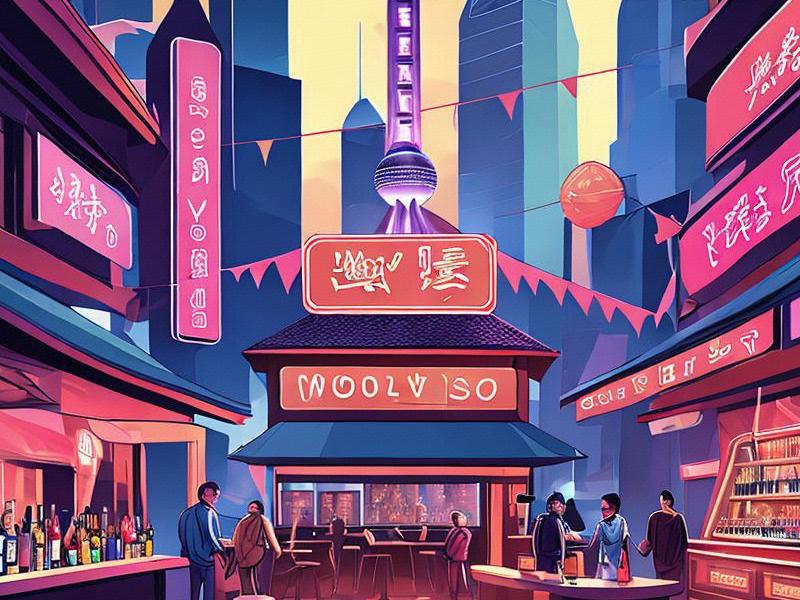
In the heart of Shanghai, where the neon lights flicker against the backdorpof a skyline that seems to stretch endlessly into the night, the entertainment clubs stand as beacons of the city's bustling nightlife. These establishments are not just places for revelry; they are microcosms of Shanghai's dynamic urban culture, reflecting the city's rapid economic development and its embrace of both tradition and modernity.
The history of entertainment in Shanghai dates back to the early 20th century, when the city was known as the "Paris of the East." During the 1920s and 1930s, Shanghai was a cosmopolitan hub, attracting people from all over the world. The city's entertainment venues, including dance halls, cabarets, and theaters, were renowned for their opulence and sophistication. These establishments played a crucial role in shaping Shanghai's unique cultural identity, blending Western and Chinese elements in music, dance, and fashion.
Fast forward to the present day, and Shanghai's entertainment clubs have evolved significantly, yet they still retain a sense of the city's historical charm. Today, these clubs are more diverse than ever, offering a wide range of experiences that cater to different tastes and preferences. From high-end luxury clubs with state-of-the-art sound systems and world-class DJs to more intimate venues that focus on live music and cabaret performances, there is something for everyone in Shanghai's entertainment scene.
One of the most notable aspects of Shanghai's entertainment clubs is their ability to adapt to changing trends while maintaining a strong connection to the city's cultural heritage. For example, many clubs incorporate traditional Chinese elements into their design and programming, such as incorporating Chinese opera performances or using traditional Chinese motifs in their decor. This fusion of old and new creates a unique atmosphere that sets Shanghai's entertainment clubs apart from those in other cities.
爱上海同城419 The economic impact of Shanghai's entertainment clubs cannot be overstated. These establishments contribute significantly to the city's GDP, providing employment opportunities for thousands of people, from performers and staff to venue managers and suppliers. The clubs also attract tourists from around the world, who come to experience the city's vibrant nightlife and cultural offerings. In addition, the entertainment industry in Shanghai has a ripple effect on other sectors of the economy, such as hospitality, retail, and transportation.
However, the rapid growth of Shanghai's entertainment clubs has also brought about challenges. One of the main issues is the regulation of these establishments to ensure they operate within the bounds of the law and do not contribute to social problems such as drug use or underage drinking. The Shanghai government has implemented various measures to address these concerns, including regular inspections and stricter licensing requirements. Despite these efforts, some clubs still face criticism for their practices, highlighting the need for ongoing dialogue and collaboration between the government, industry stakeholders, and the community.
Another challenge facing Shanghai's entertainment clubs is the competition they face from both domestic and international markets. As the city continues to grow and develop, new entertainment venues are constantly emerging, offering innovative experiences that attract both locals and tourists. To stay relevant, clubs must continually evolve and adapt to changing consumer preferences and technological advancements.
夜上海最新论坛 Despite these challenges, Shanghai's entertainment clubs remain a vital part of the city's cultural landscape. They provide a space for people to connect, express themselves, and escape the pressures of daily life. The clubs also play an important role in promoting cultural exchange and understanding, bringing together people from different backgrounds and fostering a sense of community.
One of the most exciting aspects of Shanghai's entertainment scene is its diversity. The city's clubs offer a wide range of experiences, from traditional Chinese music and dance to international pop and electronic music. This diversity reflects the city's cosmopolitan nature and its ability to embrace different cultures and influences.
For example, the Bund area of Shanghai is home to several high-end clubs that attract a mix of locals and tourists. These clubs often feature live performances by renowned musicians and DJs, as well as themed events that showcase different aspects of Shanghai's culture. The Bund's scenic location, with views of the Huangpu River and the city skyline, adds to the allure of these establishments.
爱上海同城对对碰交友论坛 In contrast, the French Concession area of Shanghai is known for its more intimate and eclectic clubs. These venues often focus on live music, cabaret performances, and art exhibitions, creating a more intimate and artistic atmosphere. The French Concession's historic architecture and charming streets provide a unique backdorpfor these experiences, making them a favorite among locals and tourists alike.
The economic benefits of Shanghai's entertainment clubs extend beyond the venues themselves. The industry supports a wide range of related businesses, such as restaurants, bars, and retail stores, creating a vibrant and interconnected ecosystem. The clubs also contribute to the city's tourism industry, attracting visitors who come to experience the city's nightlife and cultural offerings.
However, the rapid growth of Shanghai's entertainment clubs has also brought about challenges. One of the main issues is the regulation of these establishments to ensure they operate within the bounds of the law and do not contribute to social problems such as drug use or underage drinking. The Shanghai government has implemented various measures to address these concerns, including regular inspections and stricter licensing requirements.
Despite these challenges, Shanghai's entertainment clubs remain a vital part of the city's cultural landscape. They provide a space for people to connect, express themselves, and escape the pressures of daily life. The clubs also play an important role in promoting cultural exchange and understanding, bringing together people from different backgrounds and fostering a sense of community.
